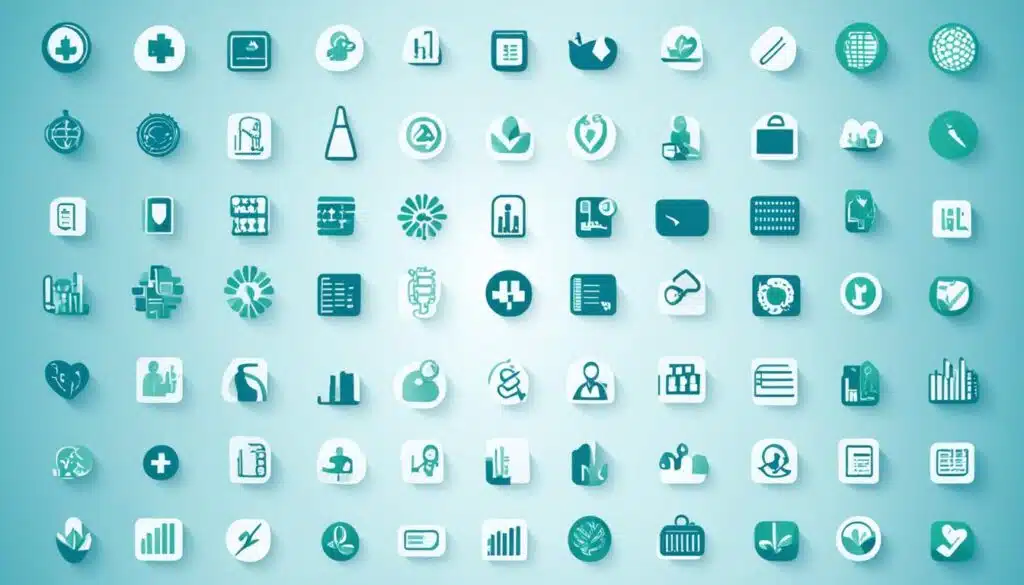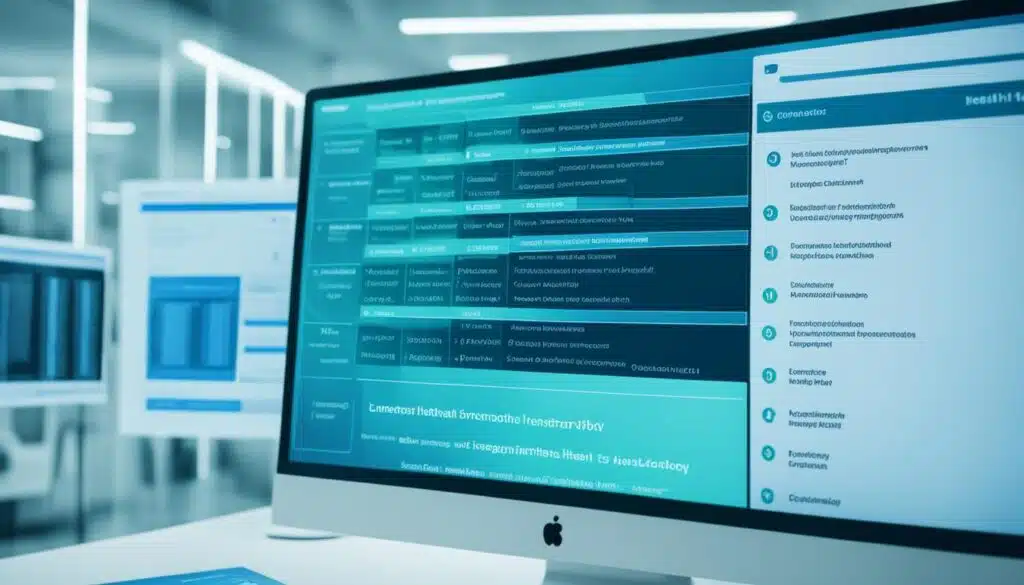Health information management greatly benefits from merging healthcare, technology, and business. It involves gathering, studying, and safeguarding medical data in digital and paper forms. This information is key for top-tier patient care. Those in the field make sure records are right and available. This empowers healthcare workers to deliver their best care to people.
Key Takeaways
- Health information management is a multifaceted field that combines healthcare, technology, and business.
- HIM professionals are responsible for managing and protecting sensitive patient data, ensuring its accuracy and accessibility.
- Careers in HIM are in high demand, offering a range of opportunities from entry-level to executive positions.
- Pursuing a degree or certification in HIM can open the door to a rewarding and impactful career in the healthcare industry.
- HIM professionals play a vital role in supporting healthcare teams and improving patient outcomes.
What is Health Information Management?
Health information management, or HIM, involves handling medical data for top-notch patient care. It’s guided by the American Health Information Management Association – AHIMA for short. AHIMA calls HIM a vital practice that guarantees the availability, accuracy, and safety of all patient-related data.
The Importance of Health Information Management
HIM ensures patient records are spot on, current, and ready for healthcare teams. Records cover a lot, from family medical history to medications. They’re usually kept in a specialized system.
Executive Director of AHIMA, Wylecia Wiggs Harris, says HIM is key for the best patient experience. It helps healthcare teams make smart decisions. Plus, it cuts costs efficiently and follows health rules. Safeguarding patient info is also a big deal.
- Improving the quality and safety of patient data
- Enhancing clinical and business decision-making
- Reducing healthcare costs through efficient data management
- Ensuring compliance with healthcare regulations and standards
- Protecting the privacy and security of sensitive patient information
“Health information management (HIM) refers to the practice of acquiring, analyzing, and protecting digital and traditional medical information vital to providing quality patient care.”
In our digital age, health information management stands out. It’s pivotal for using data to better patient health and run things smoothly. Those in HIM are vital. They make sure healthcare data is well-kept and safe. This supports top-of-the-line patient care.
Careers in Health Information Management

The field of health information management (HIM) has many job options. You can start at the bottom or aim for top jobs. There is a big need for people who can work with healthcare data well.
Exploring HIM Career Paths
In HIM, you could work in hospitals, clinics, or with software companies. Positions like Medical Records Technician and Health Information Analyst are quite common.
- Medical Records Technician: Responsible for organizing, maintaining, and securing patient records.
- Claims Specialist: Processes insurance claims and ensures accurate billing and coding.
- Health Information Analyst: Analyzes healthcare data to identify trends and improve patient outcomes.
- Director of Risk Management: Oversees the organization’s risk management strategies and policies.
- Chief Information Officer (CIO): Leads the organization’s information technology and data management initiatives.
“Health information management professionals play a crucial role in ensuring patient records are accurate, up-to-date, and accessible to healthcare teams, ultimately helping to provide the best care to patients.”
The need for HIM experts will keep growing. As digital health records become more popular, your skills in this field will be even more valuable.
Health Information Management Career Areas

The field of health information management (HIM) has many career areas. Coding and revenue cycle, Information governance, Informatics, and Data analytics are key areas. These areas need special skills and knowledge, according to the American Health Information Management Association (AHIMA).
In coding and revenue cycle, professionals ensure healthcare payments are correct. They work as medical coders, billing specialists, or revenue cycle managers. Their job is to code patient diagnoses and procedures accurately to meet healthcare regulations.
Information governance focuses on keeping healthcare data safe and private. Compliance officers, risk management specialists, and data stewards work in this area. They make sure patient information is used wisely and ethically.
The informatics area links healthcare with technology and data science. Informatics professionals work on electronic health record (EHR) systems. These roles include system analysts, clinical informaticists, and health information implementation managers.
In data analytics, professionals collect and interpret healthcare data. They include population health analysts and data quality managers. Their work helps improve patient outcomes and efficiency in healthcare organizations.
Health information management professionals are critical for good healthcare. They ensure patient data is managed accurately, securely, and efficiently. This is essential for offering high-quality care.
“Health information management professionals are the data and information experts who help ensure the availability, accuracy, and protection of the health information vital to providing quality patient care.” – AHIMA
Health Information Management

In the ever-changing healthcare world, health information management pros are key. They make sure medical data is gathered, stored, and used well. With the field always growing, these experts blend healthcare with technology and business.
They take care of many things like keeping electronic health records and keeping patient info safe. They help healthcare teams by providing the right info. This helps give the best care to patients.
The HIM field is changing fast, with new tech and fresh ways to manage data. Experts use things like Internet of Things (IoT) devices and strong information governance rules. This helps them lead in managing medical data.
| Key Areas in Health Information Management | Descriptions |
|---|---|
| Electronic Health Records (EHRs) | Maintaining and managing electronic health records to ensure accurate, accessible, and secure patient data. |
| Data Analytics | Analyzing healthcare data to identify trends, improve patient outcomes, and support strategic decision-making. |
| Information Governance | Developing and implementing policies and procedures to ensure the integrity, security, and compliance of healthcare data. |
| Compliance and Regulations | Ensuring that healthcare organizations adhere to various laws, regulations, and industry standards related to data management and patient privacy. |
The need for skilled health information management people is growing. They are the protectors of medical data. They play a big part in making care better, operations smoother, and driving healthcare’s future.
“Health information professionals play a vital role in ensuring patient records are accurate, up-to-date, and accessible to healthcare teams, ultimately helping to provide the best care to patients.”
Career Opportunities in Information Governance

The healthcare field is making more data thanks to devices like IoT wearables. This growth highlights the importance of information governance in health information management (HIM). Information governance focuses on keeping patient data safe and private. Compliance officers and risk management specialists protect this important healthcare information.
Compliance Officers: Ensuring Data Security and Privacy
Compliance officers create strong strategies to protect patient data. They ensure that healthcare groups follow laws like HIPAA and avoid data breaches or cyber attacks.
Risk Management Specialists: Proactive Risk Mitigation
Risk management specialists deal with risks in HIM information governance. They find and handle risks in how healthcare data is stored or used. Their work helps prevent and handle issues related to patient data, keeping it safe and available.
The need for experts in healthcare data governance is growing with digital changes. This creates many job chances for those looking to work in data compliance or other information governance roles in the HIM field.
“Information governance is key in managing healthcare data, making sure patient information is secure and follows the rules in our tech-driven world.”
| Career Opportunity | Key Responsibilities | Required Skills |
|---|---|---|
| Data Compliance Officer |
|
|
| Risk Management Specialist |
|
|
Transitioning into Health Information Management
Are you in IT but want to move to healthcare? Thinking of switching to health information management (HIM) from another field? There’s good news. HIM offers many chances to enter this fast-growing area.
If you’re changing from IT to health information management, your tech know-how is a big plus. Jobs like health informatics or data analytics need strong IT skills. By learning more and gaining experience, you can use your tech background in healthcare successfully.
Similarly, switching careers to HIM from another industry brings bright spots. Your skills like being detail-oriented, solving problems, and communication are a great fit. Many HIM jobs need just a bachelor’s or certificate. This means you can start with proper training.
As an IT professional eyeing healthcare or changing from any field, finding suitable HIM roles is key. Then, get the right education and training for that switch.
Pathways to a Career in Health Information Management
- Earn a bachelor’s degree in health information management or a related field, such as health informatics or healthcare administration.
- Obtain a certificate or diploma in medical coding, health data analysis, or health information technology.
- Complete a master’s degree program in health information management, health informatics, or health information systems.
- Gain relevant work experience in the healthcare industry, such as in medical records, billing, or data management.
- Consider obtaining professional certifications, such as the Registered Health Information Technician (RHIT) or Registered Health Information Administrator (RHIA) credential.
With the right training and determination, anyone can build a successful career in health information management, regardless of their background.
“Health information management is a dynamic and evolving field that offers a wide range of career opportunities for those with the right skills and expertise.”
Demand and Salary Outlook
The healthcare and technology fields offer exciting career paths. Health information management (HIM) jobs are very sought after. The Bureau of Labor Statistics says roles for medical and health services managers will go up by 32% until 2030. This is much faster growth than most jobs.
HIM job demand is high because health systems are getting more complex. There is a bigger focus on digital health records. This creates a need for experts who can control and understand health data. With the healthcare sector always changing, skilled people in healthcare management careers are and will be very much needed.
The HIM salary outlook is promising too. In 2021, the average wage for medical and health services managers was $104,280. For computer and information systems managers, it was $151,150. These numbers show how much companies value professionals who can handle and use health data well.
| Occupation | Median Annual Salary (2021) | Projected Growth Rate (2020-2030) |
|---|---|---|
| Medical and Health Services Managers | $104,280 | 32% (much faster than average) |
| Computer and Information Systems Managers | $151,150 | 11% (faster than average) |
The strong need for HIM jobs and good HIM salaries paint a positive picture. For anyone looking for both a rewarding and stable career in healthcare, these management opportunities look great.
Pursuing a Master’s in Health Information Management

A bachelor’s degree can help in many health information management jobs. But, for top positions, you need more education. Master’s in health information management degrees are essential for getting advanced roles in healthcare IT.
These advanced programs provide a deep dive into healthcare IT management. They teach skills for jobs like VP of privacy, data, or compliance, and director of health information systems. Graduates boost their value by learning about data governance, information security, and planning.
Master’s programs also focus on leadership and problem-solving. They prepare students to handle complex tech challenges in healthcare. This training helps improve care, solve issues, and meet regulations.
If you want to grow in health information management, a master’s in health information management is a smart move. It opens doors to advanced roles in healthcare IT.
Benefits of a Career in Health Information Management
Working in health information management (HIM) has many pluses. You can earn well and work in varied places. HIM jobs are both interesting and fulfilling. Let’s look at the benefits of pursuing an HIM career and why it’s smart for your future.
Competitive Salaries and Job Security
HIM jobs offer good pay. The median yearly wage for health information techs was $45,240 in 2021. The highest 10% earned more than $71,000. This field is also growing quickly, with a 9% increase expected from 2021 to 2031. This means job security for those in HIM.
Diverse Work Environments
There are many jobs to pick from in HIM. You can be a quality analyst, a coding expert, or work in record keeping. Each role lets you work in different places, like hospitals or insurance firms. This variety makes working in HIM both exciting and fulfilling.
Opportunities for Career Growth and Advancement
Health information management has lots of chances for moving up. With more skills, you can lead in HIM as a director or information officer. Many professionals also get more education. This can include a master’s or a special health info certification. It helps them grow further in their careers.
Choosing HIM can lead to a rewarding career. It’s perfect for those who love healthcare, data, and tech. With good pay, steady jobs, and many paths to choose from, an HIM career is a great option for anyone wanting a vibrant career.
Making a Difference through Health Information Management
Health information experts play a key role in making sure patient records are right, current, and easy to get. They help link info to help from hospitals reach patients. This makes a big difference in many lives, even if they don’t see the patients face-to-face.
The work of health information management (HIM) is hugely important. HIM pros manage private patient info to help healthcare folks give the best care possible. The work they do directly impacts people’s lives. Good records can save lives during emergencies.
HIM’s Role in Patient Care
HIM‘s work is all about making patient care better. They keep detailed and trustworthy records which help healthcare teams. This means teams can make smarter choices, lower mistakes, and create plans just for you. It all adds up to happier, healthier patients.
HIM folks also help set up electronic health records (EHRs) and other tech in healthcare. They make sure these tools work well, helping organizations use data to make things safer, work better, and be healthier overall.
“Health information professionals are the unsung heroes of the healthcare industry, ensuring that patient data is accurate, secure, and accessible to those who need it most.”
HIM’s reach goes beyond the hospital doors. These pros help make rules that guide how healthcare works. This helps protect patient rights and makes sure data is handled ethically.
The value of health information management is immense. HIM pros, often unnoticed, make sure patient info is right, safe, and available. Their skills and care deeply impact the level of patient care, changing lives for the better.
Also Read : Embracing Palliative Care For Quality Of Life
Conclusion
A career in health information management is both unique and rewarding. It combines interests in healthcare, technology, and business. The demand for skilled HIM professionals is going up. This field has many specialized roles and chances for career growth.
HIM professionals ensure patient data is accurate, secure, and easy to access. This is key for healthcare providers to offer the best care. If you are looking to start or change your career, consider health information management. It lets you directly impact people’s lives.
When thinking about conclusion health information management, remember the many summary HIM career options. You can have a big, positive effect. The final thoughts on HIM show that this field is growing. It’s a rewarding choice for those who love technology, healthcare, and business.
FAQs
Q: What is health information management?
A: Health information management involves the collection, organization, and protection of patient health information to ensure its accuracy and accessibility.
Q: What are the benefits of pursuing a health information management degree?
A: A degree in health information management can lead to various career opportunities in healthcare, including roles as health information managers, professionals in health information systems, and more.
Q: What job prospects are available for health information management graduates?
A: Graduates with a degree in health information management can work in a wide range of settings such as hospitals, clinics, government agencies, insurance companies, and healthcare consulting firms.
Q: How can a degree program in health information management prepare students for a career in the field?
A: Degree programs in health information management provide students with the necessary knowledge and skills to effectively manage patient health data, understand healthcare systems, and comply with industry regulations.
Q: What are some common courses in a health information management program?
A: Courses in a health information management program may cover topics such as health informatics, information management, healthcare systems, patient health data management, and more.
Q: What is the role of a health information manager?
A: Health information managers are responsible for overseeing the collection, storage, analysis, and protection of patient health information within a healthcare organization.
Q: How can I pursue a career as a health information management professional?
A: To become a health information management professional, you typically need to complete a degree program in health information management and acquire relevant work experience in the field.
Q: What are the accreditation requirements for health information management programs?
A: Health information management programs are often accredited by organizations such as the Commission on Accreditation for Health Informatics and Information Management Education (CAHIIM) to ensure they meet quality standards in education and training.
Source Links
- https://online.champlain.edu/blog/health-information-management-good-career
- https://www.cambridgehealth.edu/health-information/health-information-management-career/is-health-information-management-a-good-career/
- https://jobs.northwell.edu/blog/2019/03/28/7-reasons-we-love-being-a-health-information-professional/





